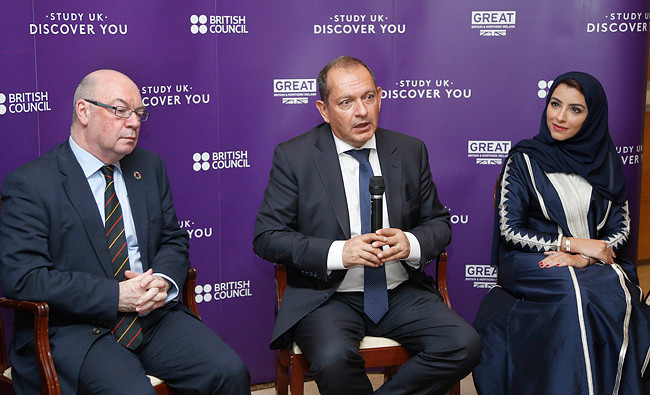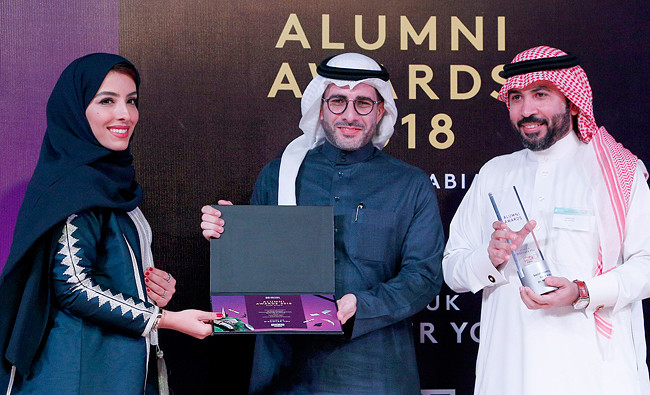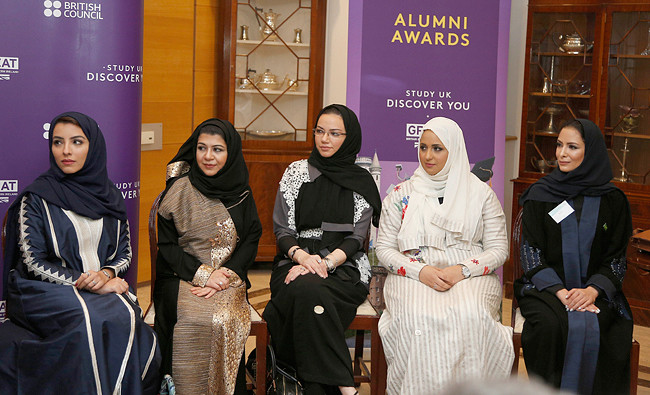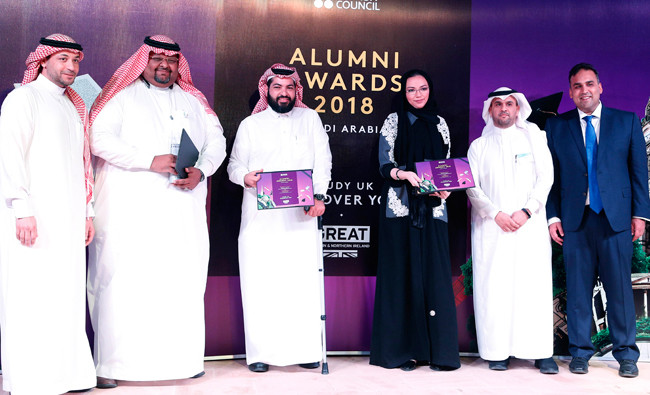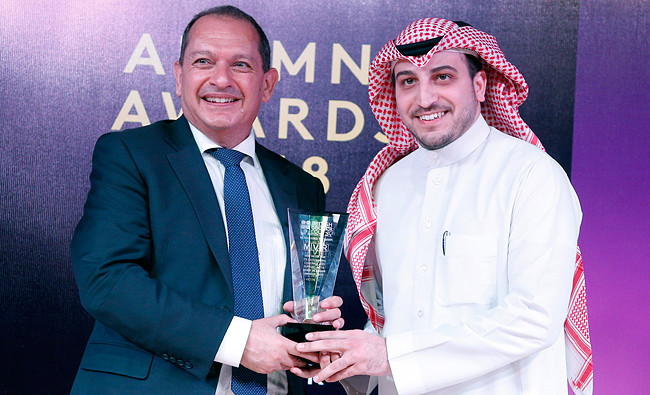RIYADH: Three Saudi Arabian graduates of UK universities have been honored for their career achievements in their home country.
Turki Altubaiti, Abdullah Adlan and Nouf Alnumair were the recipients of the third annual Study UK Alumni Awards, during a ceremony on February 26 at the residence of UK Ambassador to Saudi Arabia, Simon Collis. He opened the event by stating how proud he was to be hosting it for a third time.
“I am very happy to see such a large number of candidates every year contributing to the betterment of Saudi society,” he added.
He also paid tribute to this year’s nominees, saying: “I have been Her Majesty’s Ambassador in Saudi Arabia for three years now and I consider it an honor. But I am not the only representative of the UK present here tonight; there are nine others here with me representing the UK and upholding its positive image, as well as that of their own home country of Saudi Arabia.”
The awards, organized by the British Council and British Embassy in Saudi Arabia, celebrate the outstanding achievements of alumni who have used the experience of studying at a UK university to make a positive contribution to their community, profession and country.
Altubaiti received the Professional Achievement award, Adlan the Entrepreneurial Award, and Alnumair the Social Impact award.
Arab News Editor-in-Chief Faisal J. Abbas — who received the Social Impact award at last year’s event — gave a speech during the ceremony that highlighted the importance of education and experience in facing the challenges and changes that both kingdoms are undergoing.
“Such awards, especially in the social impact category, are not — and should not be — ends or goals themselves,” he said. “They are merely an indicator they we are hopefully on the right track of doing something that matters.
“The exciting and challenging times we are living here in Saudi Arabia can only be turned into a success by utilizing the passion, expertise and most importantly the knowledge that people of the caliber of tonight’s nominees have.”
Amir Ramzan, the British Council director in Saudi Arabia, said that discussions had taken place to ensure that Saudi citizens continue to have opportunities to study in the UK.
“The British Council has been working with various organizations, including the Ministry of Education, to ensure that the number of Saudi students able to go to the UK to study remains consistent,” he said.
He also highlighted the recently established Gulf-wide UK Alumni Network, which already has of over 2,500 members.
“We are always looking for ways to use that network to build connections between both the UK and Saudi Arabia,” he added.
There was also a surprise visit to the ceremony from Alistair Burt, the UK Minister of State for the Middle East and Minister of State at the Department for International Development.
“We’re very proud of our education system, and prouder still of those that come to us to make use of it, and use it for such good,” he said.
To be eligible for an award, candidates must have completed a degree at a UK university within the past 15 years.
The ambassador, Simon Collis, said: “There are no specific criteria for the degree studied. The focus of the prize is not the type of the degree but rather what you did with it when you came back to Saudi Arabia.”
This article has been corrected to amend the remarks by Amir Ramzan.
Saudis who studied in Britain honored for career achievements
Saudis who studied in Britain honored for career achievements
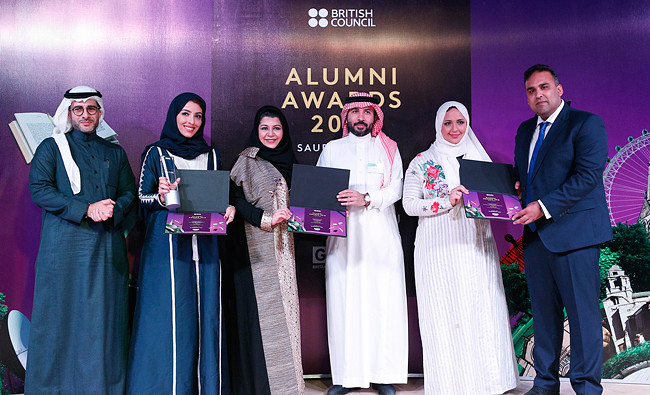
Saudi Falcons Club CEO and Kazakhstan ambassador discuss ways to boost cooperation

RIYADH: The CEO of the Saudi Falcons Club, Ahmed Al-Hababi, met Kazakhstan’s ambassador to the Kingdom, Madiyar Menilbekov, in Riyadh on Thursday to discuss opportunities for cooperation and ways in which these might be enhanced to benefit mutual goals.
One of the topics was the Hadad Program, a leading initiative developed by the club with the aim of returning falcons to their natural habitats and saving the species from the threat of extinction.
Menilbekov praised the club for the important role it plays in enhancing falconry and preserving its cultural heritage.
The club said the meeting was part of its efforts to strengthen international partnerships in keeping with the goals of the Saudi Vision 2030 plan for national development and diversification.
Saudi envoy to US outlines efforts to maintain safety of Saudi citizens amid LA wildfires

LOS ANGELES: Saudi ambassador to the US, Princess Reema bint Bandar, reaffirmed on Thursday the embassy’s commitment to the safety and security of Saudi citizens in Los Angeles and surrounding areas impacted by wildfires, the Saudi Press Agency reported.
In a statement, Princess Reema emphasized that the embassy and the consulate general were working tirelessly to support citizens affected by the fires.
She highlighted that ensuring their well-being remains a top priority for Saudi diplomatic missions in the United States.
She said the team was monitoring the situation closely and was prepared to provide immediate assistance to those in need. The embassy and consulate were dedicated to ensuring the security and safety of all Saudi citizens in affected areas, she added.
The embassy and consulate have activated a round-the-clock response team to address concerns and offer necessary support, SPA added.
The wildfires in California have prompted widespread evacuations and caused significant disruptions in the Los Angeles area, with officials working to contain the blazes.
KAUST conducts research study on microbiomes in glacier-fed streams

- Collaboration with scientists from Swiss Federal Technology Institute of Lausanne
RIYADH: The King Abdullah University of Science and Technology, in collaboration with scientists from the Swiss Federal Technology Institute of Lausanne, has conducted an unprecedented, in-depth study on microbiomes — microorganisms that live symbiotically with humans or other organisms — in glacier-fed streams.
These streams, originating from glaciers atop the Earth’s highest mountains, harbor a wealth of unique microorganisms.
The research team collected and analyzed samples from 170 glacier-fed streams over five years across regions including New Zealand, the Himalayas, the Russian Caucasus, the Tien Shan and Pamir Mountains, the European Alps, the Scandinavian Alps, Greenland, Alaska, the Rwenzori Mountains in Uganda, and the Ecuadorian and Chilean Andes, the Saudi Press Agency reported.
The findings, published in the renowned scientific journal Nature, represent the first global reference for microbiomes in glacier-fed streams.
These streams, which are among the most extreme natural freshwater ecosystems in the world, are located at mountain summits and are characterized by near-freezing temperatures and low nutrient levels.
They also serve as the origin for many of the world’s largest rivers, functioning as vital water reservoirs for the planet.
KAUST researcher Dr. Ramona Marasco emphasized that glacier-fed streams were highly vulnerable to climate change.
She spoke of the importance of establishing a baseline for their microbiomes to better understand the rate of ecological change, while highlighting KAUST’s extensive genetic sequencing efforts, which have significantly contributed to creating a comprehensive picture of these endangered microbiomes.
The researchers successfully developed the first global atlas of microorganisms in glacier-fed streams.
Their work revealed that these streams harbor a unique microbiome distinct from other cryospheric systems, such as glaciers, frozen soils, and ice-covered lakes.
About half of the bacterial species in these streams are endemic to specific mountain ranges. The scientists attribute this phenomenon to the geographical isolation of mountain ranges, similar to islands, and to the powerful natural selection exerted by the harsh conditions in glacier-fed streams.
Saudi swimmer’s remarkable 30km swim from Alkhobar to Bahrain

- Mariam Binladen’s feat of endurance and grit completed in over 11 hours
JEDDAH: In a remarkable feat of endurance and determination, Saudi Arabia’s Dr. Mariam Binladen recently completed the Khalid bin Hamad Swimming Challenge, covering a distance of 30km from Alkhobar, Saudi Arabia, to Salman City, Bahrain.
Binladen achieved this incredible feat in 11 hours, 25 minutes and 47 seconds.
Among her achievements, the open-water swimmer became the first Arab woman to cross the Red Sea to Egypt in October 2022, and the first to traverse Dubai Creek with a swim of 24 km in 2017.
In addition, she was the first woman from the Gulf to swim across the English Channel, covering 33.5 km in August 2016.
Speaking to Arab News about her feat on Dec. 26, Binladen said: “This swim was on my radar for 7 years.

“Unfortunately it was difficult to find an optimum window to do the challenge, primarily because weather conditions in the Gulf of Bahrain are incredibly difficult to predict.
“I had to study the sea very well taking into account the tides, wind speed, wave patterns, swells, water temperature and marine life cycles in order to minimize risk and achieve this goal.”
She added: “Amongst the many challenges of this event was swimming at night in the dark, in fluctuating cold-to-warm water temperatures, with the added complexity of tidal changes.
“As a way of mitigating the hazardous conditions the swim started at the Water Tower at Alkhobar at 1:50 a.m. Visibility was zero so I was swimming blind coupled with water temperatures ranging from 17 to 22 degrees.
“Instead of feeding every 30 minutes I fed every 15 minutes to avoid hypothermia and to maintain my body heat until sunrise, which was half-way through the swim.
“The tide in this area shifts every six hours which meant swimming part of the way against the tide which requires a huge amount of stamina and mental agility in order not to become exhausted.”
She added: “Each challenge poses its own distinct difficulties and unique set of conditions; during the Red Sea swim it was how to maneuver around sharks and avoid their feeding times.
“The English Channel, for example, was freezing cold and it is a busy shipping lane so it was necessary to address those concerns and plan accordingly.
“The Bahrain swim was undoubtedly hazardous and posed many issues, the distance being one of them. Before any swim I undertake area studies, conditions, risks and train to mitigate risks and for the conditions that I will face. Of course there are always some surprises.”

She has faced other challenges during her career. “My most unusual swim was in an ice glacier in Switzerland, this challenge was to swim in (minus) 2 degrees for 85 meters.
“I undertook extensive physical and cognitive training in order to prepare for this unique challenge. The burn of the ice-cold water will remain with me forever.”
In addition to being an athlete and dentist, Binladen also helps refugees and creates awareness through her platform, which has been acknowledged by organizations worldwide.
In 2016, she opened the first free medical facility of its kind for dental treatment in a Syrian refugee camp in Azraq, Jordan.
“Of course it is rewarding to treat any patients, I love to help people in any capacity I can, whether through treatment, inspiring them in sport or supporting them to swim gives me enormous satisfaction.”
As the Kingdom empowers women, Binladen said that she is delighted to be living at a time when Saudi women can pursue their ambitions in the workplace, sports and business.
“My advice to Saudi women is to never give up on your dream, with hard work and dedication you can fulfill your goals.”
On her future, she said: “It’s a common question, everybody is interested to know what’s next. All I can say is that I have a few possibilities in the pipeline and am carrying out area studies at the moment.”
“My ambition is to lead a fulfilling life in which I am constantly learning, developing, growing and making a positive impact on those around me, through my career, relationships or personal endeavors.
“I strive to pursue excellence and leave a lasting legacy that inspires others.”
Authority warns against overuse of ginseng by pregnant women, says no proof of safety

- Adverse effects of the plant-based supplement include insomnia or high blood pressure when used in large doses, warns SFDA
- It stressed that stressed that herbal supplements should be used with caution, like any other medicine
RIYADH: The Saudi Food and Drug Authority has warned against overuse of the herb ginseng due to possible negative side-effects and the lack of evidence of its safety for pregnant and breastfeeding women.
Adverse effects of the plant-based supplement include insomnia or high blood pressure when used in large doses, and the SFDA warned that there was no proof of it being safe to use during pregnancy, according to the Saudi Press Agency.
In addition, the herb may interfere with medicines for blood thinners, diabetes, heart conditions, insomnia and schizophrenia, and can interact negatively with caffeine, it said.
Ginseng, known by its scientific name Panax ginseng, is used in alternative medicine for its purported effects on energy levels, concentration and mood.
The recommended average dose is between one and two grams of the root, taken three to four times a day, for between three and four weeks, according to the report.
SFDA further stressed that herbal supplements should be used with caution, like any other medicine.
It added that claims about the safety of such supplements not supported by evidence should be handled with caution, and advised consulting a doctor before using them.
Herbal supplements can also interfere with certain foods, as well as medication, the authority added.
SFDA provides a list of prohibited medicinal plants and cosmetic products on its official website: https://www.sfda.gov.sa/ar/informationlist/66327.


